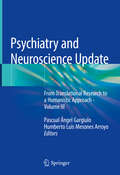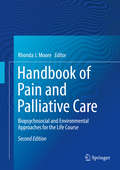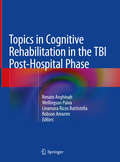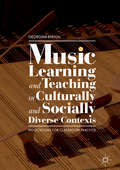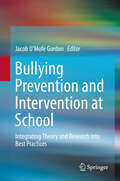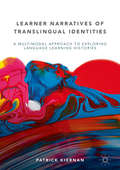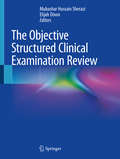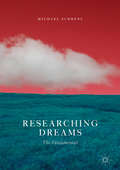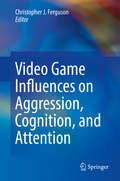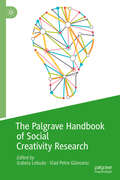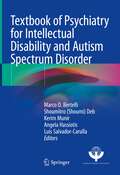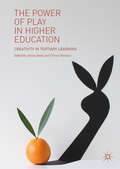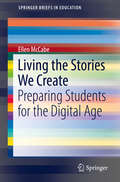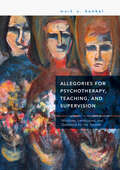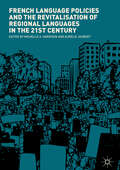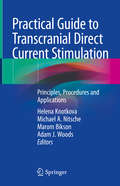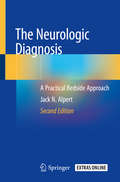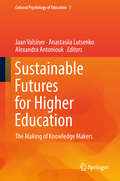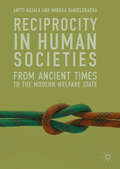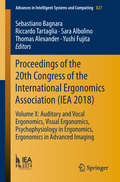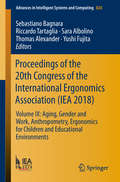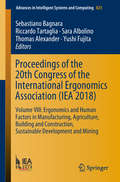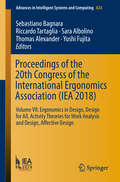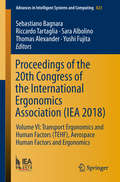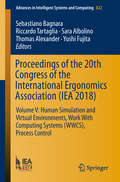- Table View
- List View
Psychiatry and Neuroscience Update: From Translational Research to a Humanistic Approach - Volume III
by Pascual Ángel Gargiulo Humberto Luis Mesones ArroyoThis broad and thought-provoking volume provides an overview of recent intellectual and scientific advances that bridge the gap between psychiatry and neuroscience, offering a wide range of penetrating insights in both disciplines. The third volume on the topic in the last several years from a varying panel of international experts, this title identifies the borders, trends and implications in both fields today and goes beyond that into related disciplines to seek out connections and influences. Similar to its two Update book predecessors, Psychiatry and Neuroscience – Volume III presents the current state-of-the-art in the main disciplines – psychiatry and neuroscience – and attempts to provide deeper comprehension or explication of the normal and diseased human mind, its biological correlates and its biographical and existential implications. This engaging volume continues the previous style of exploring different disciplines and trying to integrate disciplinary evidence from varying points of view in an organic manner. Developed for clinicians and researchers in the fields of medicine, psychiatry, psychology and biology, this third volume also will be of great interest to students and university professors of diverse disciplines.
Handbook of Pain and Palliative Care: Biopsychosocial and Environmental Approaches for the Life Course
by Rhonda J. MooreThis comprehensive revision of the invaluable reference presents a rigorous survey of pain and palliative care phenomena across the lifespan and across disciplines. Grounded in the biopsychosocial viewpoint of its predecessor, it offers up-to-date understanding of assessments and interventions for pain, the communication of pain, common pain conditions and their mechanisms, and research and policy issues. In keeping with the current public attention to painkiller use and misuse, contributors discuss a full range of pharmacological and non-pharmacological approaches to pain relief and management. And palliative care is given expanded coverage, with chapters on interventive, ethical, and spiritual concerns.· Pain, intercultural communication, and narrative medicine.· Assessment of pain: tools, challenges, and special populations.· Persistent pain in the older adult: practical considerations for evaluation and management.· Acute to chronic pain: transition in the post-surgical patient. · Evidence-based pharmacotherapy of chronic pain.· Complementary and integrative health in chronic pain and palliative care.· The patient’s perspective of chronic pain.· Disparities in pain and pain care.This mix of evolving and emerging topics makes the Second Edition of the Handbook of Pain and Palliative Care a necessity for health practitioners specializing in pain management or palliative care, clinical and health psychologists, public health professionals, and clinicians and administrators in long-term care and hospice.
Topics in Cognitive Rehabilitation in the TBI Post-Hospital Phase
by Renato Anghinah Wellingson Paiva Linamara Rizzo Battistella Robson AmorimTraumatic brain injury (TBI) refers to nondegenerative, noncongenital damage to the brain from an external mechanical force, which can lead to permanent or temporary impairment of cognitive, physical, and psychosocial functions, with an associated diminished or altered state of consciousness. Despite this broad definition, it is estimated that more than 1.500.000 people suffer TBI annually in US, with 20% afflicted with moderate or severe forms. Additionally, a high percentage of these patients are unable to return to their daily routine (approximately 50%). In this context, both motor and cognitive rehabilitation are extremely important for these individuals. The aim of cognitive and motor rehabilitation is to recover an individual’s ability to process, interpret and respond to environmental inputs, as well as to create strategies and procedures to compensate for lost functions that are necessary in familial, social, educational and occupational settings. The purpose of this book is to review the basic concepts related to TBI, including mechanisms of injury, acute and post-acute care, severity levels, the most common findings in mild, moderate and severe TBI survivors, and the most frequent cognitive and motor impairments following TBI, as well as to discuss the strategies used to support post-TBI patients. The most important rehabilitation techniques, both from cognitive and motor perspectives, are addressed. Finally, information regarding work and community re-entry and familial and psychological support are discussed in detail.Topics in Cognitive Rehabilitation in the TBI Post-Hospital Phase is intended as a reference guide for all professionals who have contact with or are related to patients suffering from TBI. Any professionals who work with or are related to patients suffering from TBI will find here a broad and comprehensive overview of TBI, addressing all essential issues, from acute care to rehabilitation strategies, follow up and re-socialization.
Music Learning and Teaching in Culturally and Socially Diverse Contexts: Implications for Classroom Practice
by Georgina BartonThis book examines the inter-relationship between music learning and teaching, and culture and society: a relationship that is crucial to comprehend in today’s classrooms. The author presents case studies from diverse music learning and teaching contexts – including South India and Australia and online learning environments – to compare the modes of transmission teachers use to share their music knowledge and skills. It is imperative to understand the ways in which culture and society can in fact influence music teachers’ beliefs and experiences: and in understanding, there is potential to improve intercultural approaches to music education more generally. In increasingly diverse schools, the author highlights the need for culturally appropriate approaches to music planning, assessment and curricula. Thus, music teachers and learners will be able to understand the diversity of music education, and be encouraged to embrace a variety of methods and approaches in their own teaching. This inspiring book will be of interest and value to all those involved in teaching and learning music in various contexts.
Bullying Prevention and Intervention at School: Integrating Theory and Research into Best Practices
by Jacob U'Mofe GordonThis book examines the continuum of bullying services, including prevention, intervention, and recovery. It reviews current theories, studies, and programs relating to this issue as well as outcome-based solutions to enhance best practices. Chapters discuss prevention and intervention services such as enhancing and promoting teacher skills in identifying abusive behaviors; interventions with bullies, victims, bystanders, and enablers; and curbing digital forms of bullying. International perspectives on program development and delivery offer fresh approaches to conceptualizing a school’s particular bullying problems and creating effective policy. In addition, chapters cover program evaluation, guiding principles for evaluators, measurement methods, and documenting and disseminating findings. The book also provides recommendations for program development. Topics featured in this book include:An Adlerian approach to predicting bullying behavior.Bibliotherapy as a strategy for bullying prevention.Coaching teachers in bullying detection and intervention.Cyberbullying prevention and intervention.The “Coping with Bullying” program in Greek secondary schools.Factors that affect reporting victimization in South African schools. Bullying Prevention and Intervention at School is a must-have resource for researchers, clinicians and other practitioners, graduate students, and policymakers across such disciplines as child and school psychology, social work/counseling, pediatrics/school nursing, and educational policy and politics.
Learner Narratives of Translingual Identities: A Multimodal Approach to Exploring Language Learning Histories
by Patrick KiernanThis book addresses translingual identities through an innovative multimodal analysis of the language learning histories of a class of advanced learners of English in Japan who grew up between two or more languages. The author explores both the translingual experiences of those in the classroom and how they use language and gesture when describing their experiences to each other. This approach uses three perspectives: it looks at the worlds and identities the interviewees construct for themselves; at their interpersonal communication; and at the way they frame their experience. Finally, it offers some lessons based on the observations of the class which reveal the values they share and the key to their success as language learners. It will appeal to applied linguistic and educational researchers, particularly those with an interest in narrative approaches to exploring educational contexts, as well as language educators and policy makers interested in gaining a learner perspective on language learning.
The Objective Structured Clinical Examination Review
by Elijah Dixon Mubashar Hussain SheraziThis review book comprehensively covers most aspects of the Objective Structured Clinical Examination (OSCE). Each chapter provides a meticulous overview of a topic featured in the OSCE, including general surgery, pediatrics, psychiatry, obstetrics and gynecology, gastroenterology, geriatrics, hematology, and ethics. Common scenarios for each topic are featured in every chapter, accompanied by instructions and tips on how to take a patient's history, diagnose a patient, discuss treatment options, and address patient concerns under each scenario. Possible areas of difficulty, common candidate mistakes made, and important differential diagnosis are outlined in each chapter. The text is also supplemented with check-lists, photographs, and tables for enhanced readability and ease of use. Written by experts in their respective fields, The Objective Structured Clinical Examination Review is a valuable resource for medical students and residents preparing for the OSCE.
Researching Dreams: The Fundamentals
by Michael SchredlWhat can be gleaned from the study of our dreams? With research methods in mind—including the shortcomings and strengths of various strategies—the book presents a comprehensive introduction to the research obtained so far. Topics include the factors of dream recall; the continuity hypothesis of dreaming; the relationship between physiology and dream content; etiology and therapy of nightmares; and lucid dreaming. The book not only presents a comprehensive introduction to the research obtained so far but also provide the tools to carry our scientific dream studies—including the shortcomings and strengths of various approaches.
Video Game Influences on Aggression, Cognition, and Attention
by Christopher J. FergusonThis book addresses the ongoing scientific debates regarding video games and their effects on players. The book features opposing perspectives and offers point and counterpoint exchanges in which researchers on both sides of a specific topic make their best case for their findings and analysis. Chapters cover both positive and negative effects of video games on players’ behavior and cognition, from contributing to violence and alienation to promoting therapeutic outcomes for types of cognitive dysfunction. The contrasting viewpoints model presents respectful scientific debate, encourages open dialogue, and allows readers to come to informed conclusions. Key questions addressed include: · Do violent video games promote violence? · Does video game addiction exist? · Should parents limit children’s use of interactive media? · Do action video games promote visual attention? · Does sexist content in video games promote misogyny in real life? · Can video games slow the progress of dementia? · Are video games socially isolating?Video Game Influences on Aggression, Cognition, and Attention is a must-have resource for researchers, clinicians and professionals as well as graduate students in developmental psychology, social work, educational policy and politics, criminology/criminal justice, child and school psychology, sociology, media law, and other related disciplines.
The Palgrave Handbook of Social Creativity Research (Palgrave Studies in Creativity and Culture)
by Vlad Petre Glăveanu Izabela LebudaThis Handbook brings together an international cast of experts to explore the social nature and context of creativity studies, focusing on methodology as a key component in advancing the social study of creativity. Two decades on from the pioneering work of Alfonso Montuori and Ronald E. Purser, the authors present a timely appraisal of past and present work in social creativity studies, and look ahead to future developments within this field. The authors collectively offer a rigorous examination of the methodological and empirical issues and techniques involved in studying social creativity. They examine the phenomenon as a form of communication and interaction within collaborative relationships; contending that creativity happens not within a vacuum but instead from a nexus of personal, social and contextual influences.This comprehensive work is organized in three parts, focusing first on the various methodological approaches applicable to the social in creativity studies. It secondly turns to empirical findings and approaches relating to the social nature of creativity. In the book’s final part, the authors offer reflections on the state of social research into creativity, pinpointing areas requiring further methodological scrutiny and empirical verification, and areas that may inspire further theoretical or applied work. Combining classic ideas with cutting-edge, emerging methods, this work provides a vital methodological ‘toolbox’ for investigators within social creativity.
Textbook of Psychiatry for Intellectual Disability and Autism Spectrum Disorder
by Angela Hassiotis Marco O. Bertelli Shoumitro Shoumi Deb Kerim Munir Luis Salvador-CarullaThis textbook provides a state of the art of the knowledge on the prevalence, risk and etiological factors, clinical features, assessment procedures and tools, diagnostic criteria, treatment, and prognosis of the psychiatric disorders encountered in people with intellectual disability (ID) and low-functioning autism spectrum disorder (ASD). ID and ASD represent two meta-syndromic groups of several different conditions, each with particular cognitive and communication features. People with ID/ASD display an increased prevalence of a variety of psychiatric disorders, including psychotic disorders, mood disorders, anxiety and stress-related disorders, somatoform disorders, and obsessive-compulsive disorder, as well behavioral syndromes, personality disorders, and disorders due to psychoactive substance use. This book will enable readers to understand the specificities of psychiatric disorders in the context of ID/ASD. It explains clearly how diagnostic criteria and assessment procedures for psychiatric disorders that were created for the general population have to be modified for use with ID/ASD. Above all, it will enable clinicians to overcome difficulties in diagnosis and to deliver more effective care that meets the particular needs of patients with ID/ASD.
The Power of Play in Higher Education: Creativity in Tertiary Learning
by Alison James Chrissi NerantziThis book examines the increasing popularity of creativity and play in tertiary learning, and how it can be harnessed to enhance the student experience at university. While play is often misunderstood as something ‘trivial’ and associated with early years education, the editors and contributors argue that play contributes to social and human development and relations at a fundamental level. This volume invalidates the commonly held assumption that play is only for children, drawing together numerous case studies from higher education that demonstrate how researchers, students and managers can benefit from play as a means of liberating thought, overturning obstacles and discovering fresh approaches to persistent challenges. This diverse and wide-ranging edited collection unites play theory and practice to address the gulf in research on this fascinating topic. It will be of interest and value to educators, students and scholars of play and creativity, as well as practitioners and academic leaders looking to incorporate play into the curriculum.
Living the Stories We Create: Preparing Students for the Digital Age (SpringerBriefs in Education)
by Ellen McCabeThis work explores the potential of digital media to rectify the disparity between formal learning contexts and contemporary perceptions and expectations of narrative. How can education systems respond to the changing technological landscape, thus preparing students to become active participants in society as well as to realise the extent of their own potential? This book explores such concepts in the classroom environment through direct engagement with students and teachers with the case of Shakespeare's Macbeth. Written in approximately 1606, Macbeth has its roots in a culture of orality and yet has sustained through centuries of print dominance. Indeed, as both text and performance the work itself embodies both the literary and the oral. Yet as a staple of many second level curricula increasingly Macbeth is perceived as an educational text. Macbeth reflects its cultural moment, an age of ambiguity where much like today notions of selfhood, privacy, societal structures, media and economy were being called into question. Thus Macbeth can be understood as a microcosm of the challenges existing in contemporary education in both content and form. This book examines Macbeth as a case-study in seeking to explore the implications of digital media for learning, as well as its possible potential to constructively facilitate in realigning formal learning contexts to contemporary experiences of narrative.
Allegories for Psychotherapy, Teaching, and Supervision: Windows, Landscapes, and Questions for the Traveler
by Mark A. KunkelThis book explores the practice of psychotherapy, teaching, and supervision via allegory, metaphor, and myth. Based upon the author’s own extensive teaching and practice, Mark Kunkel takes the reader through a series of vignettes that are windows not only into reality, but also into the soul. The author's approach reflects his vocational commitment to an integration of conceptualization, affective involvement, and application. These allegories, parables, and myths serve to clarify and open important issues in teaching, psychotherapeutic, and clinical supervisory settings, and are intended to be allies in individual study and group discussion alike.
French Language Policies and the Revitalisation of Regional Languages in the 21st Century
by Michelle A. Harrison Aurélie JoubertThis edited volume presents an analysis of the evolution of French language policies and their impact on French regional languages and their communities. It gathers studies on language revitalisation from several territorial minority languages (Breton, Alsatian, Catalan, Occitan, Basque, Corsican, Francoprovençal, Picard, Reunionese) and evaluates the challenges and opportunities that they face in the 21st century. The chapters tackle different aspects of language endangerment and language planning and adopt varied theoretical and methodological approaches. The first section of the book reconsiders the difficulties in establishing linguistic boundaries and classification for some regional languages. The second section examines the important theme of the new generation of speakers with issues of transmission and identity formation and the changes they can bring to traditional communities. The third section highlights new developments in the context of new technologies and the heightened visibility of regional languages. Finally, the last section presents an overview of the contemporary situation of minority language revitalisation in France and synthesises the key trends identified in this volume: from the educational domain to the European Charter for Minority and Regional languages. This book will appeal to students and scholars of the sociology of language, sociolinguistics, language policy, minority languages and language endangerment.
Practical Guide to Transcranial Direct Current Stimulation: Principles, Procedures and Applications
by Helena Knotkova Michael A. Nitsche Marom Bikson Adam J. WoodsThis book provides a comprehensive overview on Transcranial Direct Current Stimulation (tDCS) and the clinical applications of this promising technique. Separated into three parts, the book begins with basic principles, mechanisms and approaches of tDCS. This is followed by a step-by-step practicum, methodological considerations and ethics and professional conduct pertaining to this novel technique. Chapters are authored by renowned experts who also direct and plan tDCS educational events worldwide. Bridging the existing gap in instructional materials for tDCS while addressing growing interest in education in this field, professionals within a broad range of medical disciplines will find this text to be an invaluable guide.
The Neurologic Diagnosis: A Practical Bedside Approach
by Jack N. AlpertAn introductory text that transitions into a moderately advanced, case-based analysis of neurologic disorders and diseases, this book emphasizes how to simplify the process of making a neurologic diagnosis. Medical students and residents are often intimidated by a deluge of data, perception of anatomic complexity, extensive differential diagnoses, and often have no organized structure to follow. Diagnostic methods of general medicine are not applicable. Indeed, neurology is a unique specialty since it requires the intermediary step of an anatomic diagnosis prior to proffering a differential diagnosis. Yet the required knowledge of neuroanatomy need not be profound for the student or resident who will not specialize in neurology or neurosurgery. The Neurologic Diagnosis: A Practical Bedside Approach, 2nd Edition is primarily directed to neurology and neurosurgery residents but it will be useful for medical and family practice residents who will discover that a great percentage of their patients have neurologic symptoms. A one-month neurology rotation out of four years of medical school is not sufficient to make a cogent neurologic diagnosis. The aim of this concise, practical book -- which includes an in-depth video of how to perform a neurologic examination -- is to facilitate the process of establishing a neuroanatomic diagnosis followed by a rigorous analysis of symptoms and signs to reach a well-thought out differential diagnosis. Focused and succinct, this book is an invaluable resource for making a lucid neurologic diagnosis.
Sustainable Futures for Higher Education: The Making of Knowledge Makers (Cultural Psychology of Education #7)
by Jaan Valsiner Anastasiia Lutsenko Alexandra AntonioukThis volume addresses the current situation in higher education and what creative action needs to be taken for the future development of the various systems of higher education. Higher education in the 21st centuries is under immense pressure from various sides. First, there is dramatic limitation of funding from public sources and limited and selective funding support from private sources that is re-constructing the landscape of higher education in most societies around the World. Secondly there is the continuous stream of administrative re-organization efforts of political origins (e.g. “the Bologna process”) that guide the advancement of higher education in our present time. Increasing privatization of all forms of higher education—from bachelor to doctoral levels—and its corresponding focus on the advancement of the kind of knowledge that has immediate applicability in various spheres of societies leads to the question- what kind of creativity is expected from the new cohorts of students—future makers of knowledge—once the current social re-organization of higher education systems becomes fully established. To address these questions the international, interdisciplinary cast of authors in this volume provides a multitude of possible scenarios for future development of the systems of higher education. This book on “Sustainable Futures of Higher Education” captures the current trends and perspectives of the Knowledge Makers from various nations of the world on meeting and greeting the challenges of globalization and the pressures of the knowledge economy. It makes a strong case for universities of tomorrow sustaining their autonomous thinking and yet nurturing an environment of collaborative partnership with society, corporate and industry to fuel innovations in plenty and continuous supply of new science and technologies. Higher Education has been and shall remain a powerful vehicle of national and global transformation. I see a great value of the publication in impacting the minds of the leaders in higher education around the globe for revitalizing the universities.Professor P. B Sharma, President of Association of Indian Universities, AIU How should the higher education system be in the globalization era? In this book Jaan Valsiner and his colleagues analyze, criticize the existing and propose a new higher education system. When we say "higher education”, three different layers are supposed to be there-- the lower, the middle and the higher. The latter has the function of production of new knowledges. Without new knowledge, our societies are never improving. Authors warn commercialized systems such as the “Bologna system” overestimate the homogeneity of education. ““Universities without Borders” would guarantee both diversity and innovation in the higher education systems.Professor Tatsuya Sato, Dean of Research, Ritsumekan University
Reciprocity in Human Societies: From Ancient Times to the Modern Welfare State
by Antti Kujala Mirkka DanielsbackaPresenting new insights into reciprocity, this book combines Marcel Mauss’s well-known gift theory with Barrington Moore’s idea of mutual obligations linking rulers and the ruled. Teasing out the interrelatedness of these approaches, Reciprocity in Human Societies suggests that evolutionary psychology reveals a human tendency for reciprocity and collaboration, not only in a mutually cooperative way but also through increasing retributive moral emotions. The book discusses various historical societies and the different models of the current welfare state—Nordic (social democratic), conservative, and liberal— and the repercussions of the neoliberal policies of tax havens, tax cuts, and austerity with a cross-disciplinary approach that bridges evolutionary psychology, sociology, and social anthropology with history.
Proceedings of the 20th Congress of the International Ergonomics Association: Volume X: Auditory and Vocal Ergonomics, Visual Ergonomics, Psychophysiology in Ergonomics, Ergonomics in Advanced Imaging (Advances in Intelligent Systems and Computing #827)
by Thomas Alexander Sebastiano Bagnara Riccardo Tartaglia Sara Albolino Yushi FujitaThis book presents the proceedings of the 20th Congress of the International Ergonomics Association (IEA 2018), held on August 26-30, 2018, in Florence, Italy. By highlighting the latest theories and models, as well as cutting-edge technologies and applications, and by combining findings from a range of disciplines including engineering, design, robotics, healthcare, management, computer science, human biology and behavioral science, it provides researchers and practitioners alike with a comprehensive, timely guide on human factors and ergonomics. It also offers an excellent source of innovative ideas to stimulate future discussions and developments aimed at applying knowledge and techniques to optimize system performance, while at the same time promoting the health, safety and wellbeing of individuals. The proceedings include papers from researchers and practitioners, scientists and physicians, institutional leaders, managers and policy makers that contribute to constructing the Human Factors and Ergonomics approach across a variety of methodologies, domains and productive sectors. This volume includes papers addressing the following topics: Auditory and Vocal Ergonomics, Visual Ergonomics, Psychophysiology, and Ergonomics in Advanced Imaging.
Proceedings of the 20th Congress of the International Ergonomics Association: Volume IX: Aging, Gender and Work, Anthropometry, Ergonomics for Children and Educational Environments (Advances in Intelligent Systems and Computing #826)
by Thomas Alexander Sebastiano Bagnara Riccardo Tartaglia Sara Albolino Yushi FujitaThis book presents the proceedings of the 20th Congress of the International Ergonomics Association (IEA 2018), held on August 26-30, 2018, in Florence, Italy. By highlighting the latest theories and models, as well as cutting-edge technologies and applications, and by combining findings from a range of disciplines including engineering, design, robotics, healthcare, management, computer science, human biology and behavioral science, it provides researchers and practitioners alike with a comprehensive, timely guide on human factors and ergonomics. It also offers an excellent source of innovative ideas to stimulate future discussions and developments aimed at applying knowledge and techniques to optimize system performance, while at the same time promoting the health, safety and wellbeing of individuals. The proceedings include papers from researchers and practitioners, scientists and physicians, institutional leaders, managers and policy makers that contribute to constructing the Human Factors and Ergonomics approach across a variety of methodologies, domains and productive sectors. This volume includes papers addressing the following topics: Aging, Gender and Work, Anthropometry, and Ergonomics for Children and Education.
Proceedings of the 20th Congress of the International Ergonomics Association: Volume X: Auditory And Vocal Ergonomics; Visual Ergonomics; Psychophysiology; Ergonomics In Advanced Imaging (Advances In Intelligent Systems and Computing #827)
by Thomas Alexander Sebastiano Bagnara Riccardo Tartaglia Sara Albolino Yushi FujitaThis book presents the proceedings of the 20th Congress of the International Ergonomics Association (IEA 2018), held on August 26-30, 2018, in Florence, Italy. By highlighting the latest theories and models, as well as cutting-edge technologies and applications, and by combining findings from a range of disciplines including engineering, design, robotics, healthcare, management, computer science, human biology and behavioral science, it provides researchers and practitioners alike with a comprehensive, timely guide on human factors and ergonomics. It also offers an excellent source of innovative ideas to stimulate future discussions and developments aimed at applying knowledge and techniques to optimize system performance, while at the same time promoting the health, safety and wellbeing of individuals. The proceedings include papers from researchers and practitioners, scientists and physicians, institutional leaders, managers and policy makers that contribute to constructing the Human Factors and Ergonomics approach across a variety of methodologies, domains and productive sectors. This volume includes papers addressing the following topics: Ergonomics in Manufacturing, Agriculture, Building and Construction, and Mining, and Human Factors and Sustainable Development.
Proceedings of the 20th Congress of the International Ergonomics Association: Volume X: Auditory And Vocal Ergonomics; Visual Ergonomics; Psychophysiology; Ergonomics In Advanced Imaging (Advances In Intelligent Systems and Computing #827)
by Thomas Alexander Sebastiano Bagnara Riccardo Tartaglia Sara Albolino Yushi FujitaThis book presents the proceedings of the 20th Congress of the International Ergonomics Association (IEA 2018), held on August 26-30, 2018, in Florence, Italy. By highlighting the latest theories and models, as well as cutting-edge technologies and applications, and by combining findings from a range of disciplines including engineering, design, robotics, healthcare, management, computer science, human biology and behavioral science, it provides researchers and practitioners alike with a comprehensive, timely guide on human factors and ergonomics. It also offers an excellent source of innovative ideas to stimulate future discussions and developments aimed at applying knowledge and techniques to optimize system performance, while at the same time promoting the health, safety and wellbeing of individuals. The proceedings include papers from researchers and practitioners, scientists and physicians, institutional leaders, managers and policy makers that contribute to constructing the Human Factors and Ergonomics approach across a variety of methodologies, domains and productive sectors. This volume includes papers addressing the following topics: Ergonomics in Design, Activity Theories for Work Analysis and Design, and Affective Design.
Proceedings of the 20th Congress of the International Ergonomics Association: Volume VI: Transport Ergonomics and Human Factors (TEHF), Aerospace Human Factors and Ergonomics (Advances in Intelligent Systems and Computing #823)
by Thomas Alexander Sebastiano Bagnara Riccardo Tartaglia Sara Albolino Yushi FujitaThis book presents the proceedings of the 20th Congress of the International Ergonomics Association (IEA 2018), held on August 26-30, 2018, in Florence, Italy. By highlighting the latest theories and models, as well as cutting-edge technologies and applications, and by combining findings from a range of disciplines including engineering, design, robotics, healthcare, management, computer science, human biology and behavioral science, it provides researchers and practitioners alike with a comprehensive, timely guide on human factors and ergonomics. It also offers an excellent source of innovative ideas to stimulate future discussions and developments aimed at applying knowledge and techniques to optimize system performance, while at the same time promoting the health, safety and wellbeing of individuals. The proceedings include papers from researchers and practitioners, scientists and physicians, institutional leaders, managers and policy makers that contribute to constructing the Human Factors and Ergonomics approach across a variety of methodologies, domains and productive sectors. This volume includes papers addressing the following topics: Transport Ergonomics and Human Factors (TEHF), and Aerospace Human Factors and Ergonomics.
Proceedings of the 20th Congress of the International Ergonomics Association: Volume X: Auditory And Vocal Ergonomics; Visual Ergonomics; Psychophysiology; Ergonomics In Advanced Imaging (Advances In Intelligent Systems and Computing #827)
by Thomas Alexander Sebastiano Bagnara Riccardo Tartaglia Sara Albolino Yushi FujitaThis book presents the proceedings of the 20th Congress of the International Ergonomics Association (IEA 2018), held on August 26-30, 2018, in Florence, Italy. By highlighting the latest theories and models, as well as cutting-edge technologies and applications, and by combining findings from a range of disciplines including engineering, design, robotics, healthcare, management, computer science, human biology and behavioral science, it provides researchers and practitioners alike with a comprehensive, timely guide on human factors and ergonomics. It also offers an excellent source of innovative ideas to stimulate future discussions and developments aimed at applying knowledge and techniques to optimize system performance, while at the same time promoting the health, safety and wellbeing of individuals. The proceedings include papers from researchers and practitioners, scientists and physicians, institutional leaders, managers and policy makers that contribute to constructing the Human Factors and Ergonomics approach across a variety of methodologies, domains and productive sectors. This volume includes papers addressing the following topics: Human Simulation and Virtual Environments, Work With Computing Systems (WWCS), and Process Control.
